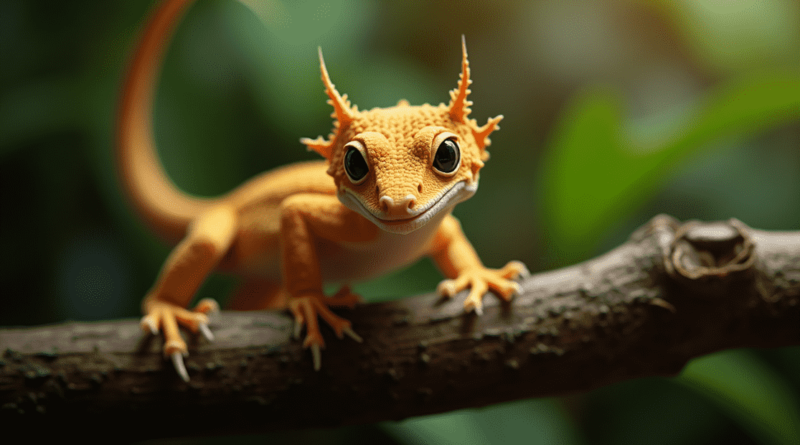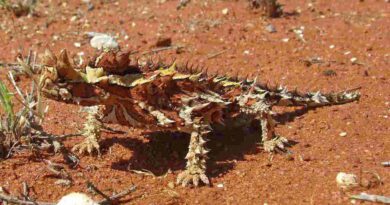Why Your Crested Gecko Lifespan Could Be Shorter Than You Think [Expert Guide]
Scientists found the crested gecko in 1994. Everyone thought these amazing creatures were extinct. These geckos can live 15 to 20 years in captivity, but different things can reduce their lifespan by a lot.
Our experience with geckos has taught us plenty. These unique creatures grow up in just 6 to 12 months. They need special care to stay healthy. One thing makes them different from other reptiles – they can’t grow their tails back if they lose them. This makes proper care a vital part of keeping them. These geckos face many challenges in the wild. The little fire ant poses a serious threat to them. That’s why we need to pay extra attention to their care needs.
Let me share everything about your gecko’s lifespan and some practical tips to help your pet live longer and healthier.
Understanding Natural Crested Gecko Lifespan
Scientists have started studying crested geckos in their natural habitat. This makes it hard to know exactly how long they live in the wild [1]. These remarkable creatures face many challenges that greatly affect their chances of survival.
Average lifespan in the wild
Wild crested geckos usually live between 5 to 15 years[1]. Their shorter lifespan mainly comes from constant exposure to predators and limited resources. The highest risk of death occurs during their first year of life [2].
Key factors affecting survival
Wild crested geckos’ survival depends on several important factors:
- Predation from birds, snakes, and mammals [3]
- Competition for food and shelter
- Weather fluctuations and climate changes
- Limited access to veterinary care
- Higher exposure to parasites and diseases [1]
Habitat loss has become a serious threat to these creatures. This has led to their classification as vulnerable on the IUCN Red List[1]. Little fire ants, an invasive species, have created new challenges for young geckos trying to survive in their natural environment [4].
Natural defense mechanisms
Crested geckos have remarkable defense strategies. Their most notable survival technique is tail detachment – a process called autotomy [5]. The detached tail moves on its own, creating a vital distraction that lets the gecko escape from predators [4].
These clever reptiles have exceptional sight, hearing, and smell that help them detect approaching threats early [4]. Some can change colors and blend naturally with their surroundings to avoid detection [4]. Most wild crested geckos found today don’t have their tails, which shows they often use this defense mechanism [5].
Common Mistakes That Reduce Lifespan
Good care can make a huge difference in your crested gecko’s life. Many pet owners make mistakes without knowing it, and these errors can shorten their gecko’s life. Let’s get into these common problems and how to fix them.
Incorrect temperature settings
Your crested gecko needs the right temperature to survive. Heat above 85°F (29°C) can kill them [6]. When temperatures stay at or below 72°F (22°C), geckos become sluggish and lose their appetite [7]. They do best in temperatures between 70-78°F (21-26°C) [8]. Many owners just keep their geckos at room temperature and forget these animals need a proper heat source to digest food and stay healthy [7].
Poor humidity control
Wrong humidity levels can hurt your gecko’s health in two ways. The humidity should move between 60-80%, going up to 80% at night [9]. Too much moisture can lead to breathing problems and issues with their scales [10]. Your gecko’s home needs good airflow and should dry to 45-50% before you mist again [9]. Using distilled water for misting hurts your gecko because it doesn’t have the minerals they need [6].
Inadequate nutrition
What your crested gecko eats can affect how long they live. Here’s what they need to eat:
- Commercial crested gecko diet (CGD) should be 80% of what they eat [11]
- Live insects should be 10% of their diet [11]
- Fresh fruits make up the last 10% [11]
- Add calcium 3-4 times weekly for young geckos and breeding females [12]
Handling stress
Bad handling stresses your gecko and can make their life shorter. New gecko owners should know their pets need at least 2 weeks to feel at home [13]. Start with short 1-2 minute handling sessions every other day [13]. Put them back in their home right away if you see signs of stress like heavy breathing or tail twitching [13]. Never handle baby geckos because they jump too much and can get hurt easily [13].
Early Warning Signs of Health Issues
Early detection of health issues can substantially extend your crested gecko’s lifespan. to survive Wild geckos excel at hiding illness[14]. This makes regular health checks a must for pet owners.
Changes in eating habits
Your gecko’s appetite gives a clear picture of their health. A healthy crested gecko sticks to regular eating patterns and feeds at night [5]. Sudden appetite changes need attention. These reptiles can survive without food for up to three weeks [15]. Any fasting that goes beyond two weeks means you should see a vet.
Weight changes often point to health problems. Weekly weight checks are a great way to get vital information[14]. Here’s how to track weight properly:
- Put your gecko in a small container on a scale
- Take weekly measurements
- Look for sudden weight changes
- Keep track of food intake
- Write down feeding responses
Unusual behavior patterns
Changes in behavior show up before visible health problems. Look out for these warning signs:
Your gecko might show breathing problems by opening their mouth or making crackling sounds [16]. Lack of energy plus poor appetite usually means something’s wrong [1]. Yes, it is time to act fast when you notice big changes in normal activity.
Problems with shedding are another vital sign. Keep an eye on stuck shed on toes, head, or tail [1]. The right humidity helps prevent these issues. Ongoing shedding problems might point to deeper health concerns.
These physical symptoms mean you should see a vet right away:
- Throwing up food [1]
- Thin tail, especially if you suspect parasites [1]
- Trouble breathing or mouth discharge [16]
- Unusual swelling [16]
- Skin looking pale or ashy when not shedding [16]
Note that geckos slow down before they shed [5]. But long periods of no activity, especially with other symptoms, need a vet’s check. Keeping good records of your gecko’s behavior, eating habits, and weekly weights helps you spot health issues early [14].
Creating an Optimal Living Environment
Your crested gecko’s lifespan depends on creating the perfect living space. A well-laid-out habitat will give a healthy growth pattern and protect against health problems caused by stress.
Proper enclosure setup
Glass terrariums work best to control humidity levels [4]. Your adult crested gecko needs at least a 45x45x60cm enclosure, but a taller 45x45x90cm setup provides better living conditions [4]. Height matters more than width because these arboreal creatures love to climb [4].
Your gecko needs plenty of climbing options with branches, vines, and plants. Live plants stay cleaner than artificial ones [4]. Sturdy plants like pothos, philodendron, and dracaena help create a natural setting and keep humidity balanced [17].
Essential equipment
Your habitat needs these vital components:
- UVB lighting (Arcadia Shade-dweller 7%) mounted above mesh [4]
- Heat lamp with dome reflector for basking area [4]
- Dimming thermostat to maintain safe temperatures [4]
- Digital thermometer/hygrometer for environmental monitoring [4]
- Dual feeding ledge for food and water [4]
- Substrate suitable for maintaining humidity [4]
The heating system should keep daytime temperatures between 72-75°F in the warm zone and 68-75°F in the cooler area [5]. Daily misting helps maintain humidity levels between 60-80% [5].
Cleaning routines
A clean habitat substantially extends your gecko’s lifespan. You should spot clean every day by removing waste, uneaten food, and checking water freshness [5]. The weekly cleaning process includes:
- Move your gecko to a secure temporary enclosure
- Remove all decorations and substrate
- Clean the tank with reptile-safe disinfectant
- Let everything dry completely before reassembly
- Replace substrate and sanitized decorations [5]
Bioactive setups need cleaning only 2-3 times yearly [18]. You should sanitize all decorations, plants, and branches monthly to stop bacteria from growing [19]. Good ventilation prevents respiratory infections and keeps humidity at the right levels [3].
Extending Your Gecko’s Life Through Prevention
Your crested gecko’s lifespan depends on good prevention strategies. You can help your pet live longer by taking the right steps early.
Regular health checks
are the life-blood of preventive care Annual veterinary visits[2]. These checkups help you spot problems before they get serious. We conducted full examinations, including fecal parasite screenings, to keep your pet healthy [2].
Daily health checks at home are vital. Look for clear, bright eyes and smooth skin with no blisters [3]. A healthy crested gecko should have a straight tail and spine [3]. Weekly weigh-ins help you catch health issues early, so make them part of your routine.
Diet optimization
The right feeding plan can substantially affect how long your gecko lives. should be your pet’s main food source Commercial Crested Gecko Diet (CGD)[20]. Here’s what works best:
- Give CGD every other day and clean up leftover food next morning [20]
- Feed live insects three times a week to help them grow [20]
- Use calcium powder to dust insects [21]
- Feed insects nutrient-rich foods 24-48 hours before giving them to your gecko [21]
Some owners mix CGD with specific fruits successfully. In spite of that, fruits should only be treats to avoid poor nutrition [6]. If you use commercial diets with insects, like Pangea With Insects or Repashy Grubs N’ Fruit, you don’t need extra live insects – but they’re great for exercise and enrichment [6].
Stress reduction techniques
A longer lifespan means keeping your gecko’s stress levels low. New geckos need two weeks to get used to their home before you try handling them [13]. Start with short 1-2 minute sessions every other day and slowly make them longer as your pet gets comfortable [13].
Multiple hiding spots help reduce stress naturally. Your gecko needs easy access to safe spots because it matches how they stay safe in nature [22]. Different climbing structures and textures keep your pet’s mind sharp and body active [23].
These stress management tips work well:
- Handle your gecko at the same times
- Move slowly during interactions
- Pick nighttime for handling – that’s when they’re active [13]
- Put hiding spots all around the cage [22]
- Keep other pets away during handling time [20]
Watch for signs of stress like heavy breathing or tail waving [24]. Put your gecko back in their cage right away if you see these signs. On top of that, pregnant females need extra gentle handling [13].
Good prevention, proper food, and regular health checks help your crested gecko live a full life. Quick action often stops bigger health problems, so keep an eye on your pet and give them the care they need.
Common Tips
Crested geckos can live up to 20 years in captivity, but their lifespan heavily depends on the care they get. Our experience with these fascinating creatures shows that successful gecko care needs a proper habitat setup, consistent health monitoring, and gentle handling techniques.
Most gecko owners often overlook subtle health signs or make basic care mistakes that could cut their pet’s life short. Your gecko needs regular vet checkups and daily monitoring of its eating habits and behavior patterns to catch potential problems early.
Your gecko’s longevity depends on keeping the right temperature, humidity levels, and proper nutrition. A clean, enriched environment combined with these elements builds the foundation for a healthy life.
Your crested gecko has its own personality traits and specific care requirements. Quick action becomes possible when you know your pet’s normal patterns and can spot changes fast. These guidelines will help your crested gecko reach its maximum lifespan.
FAQs
Q1. What temperature range is ideal for crested geckos?
A1. Crested geckos thrive in temperatures between 70-78°F (21-26°C) during the day, with a slight drop at night. It’s crucial to maintain this range and avoid extremes, as temperatures above 85°F (29°C) can be fatal, while consistent temperatures below 72°F (22°C) can lead to health issues.
Q2. How often should I feed my crested gecko?
A2. Adult crested geckos should be fed every 2-3 days. Their diet should primarily consist of a commercial crested gecko diet (CGD), which makes up about 80% of their food intake. Insects and fresh fruits can be offered as occasional treats, comprising the remaining 20% of their diet.
Q3. What are signs of stress in crested geckos?
A3. Signs of stress in crested geckos include heavy breathing, tail twitching, sudden color changes (especially to an ashy gray), and unusual inactivity. If you notice these signs, immediately return your gecko to its enclosure and minimize handling until it calms down.
Q4. How can I maintain proper humidity for my crested gecko?
A4. Maintain humidity levels between 60-80% for your crested gecko. Mist the enclosure once or twice daily, ensure proper ventilation, and use a substrate that retains moisture well. Monitor humidity levels with a digital hygrometer and adjust your misting routine as needed.
Q5. What should I include in my crested gecko’s enclosure?
A5. Create a vertical enclosure with plenty of climbing opportunities. Include branches, vines, and both live and artificial plants. Provide multiple hiding spots, a shallow water dish, and a feeding ledge. Use a substrate that retains humidity, such as coconut fiber or forest floor bedding. Ensure proper lighting and temperature gradients within the enclosure.
References
[1] – https://www.myfamilyvets.co.uk/gecko-health-problems
[2] – https://coloradoexoticanimalhospital.com/lizards/basic-care-crested-gecko
[3] – https://www.rspca.org.uk/documents/1494939/7712578/Crested+gecko+care+sheet+%28PDF+676KB%29.pdf/4a4aab54-0a6b-b401-6ee4-c2f88fbd2ad3?version=3.0&t=1559127988608&download=true
[4] – https://exoticdirect.co.uk/news/crested-gecko-setup-how-setup-complete-crested-gecko-terrarium/
[5] – https://www.petmd.com/reptile/crested-gecko-care-sheet
[6] – https://reptifiles.com/crested-gecko-care/crested-gecko-food/
[7] – https://reptifiles.com/crested-gecko-care/crested-gecko-temperatures-humidity/
[8] – https://guardiansofthegeckos.com/pages/crested-gecko-care-guide-correlophus-ciliatus?srsltid=AfmBOoo29nZh7dJZI1D-saZKXCV5sPOlK5lVFdGWqlREG33L0t_qbxNJ
[9] – https://www.zenhabitats.com/blogs/reptile-care-sheets-resources/complete-humidity-and-hydration-guide-for-crested-geckos?srsltid=AfmBOopElk8VthdsvX27GvfKALi7rV1wOEvrMG4rIPAIKZyGwmrGQH6E
[10] – https://www.jabberwockreptiles.com/news/learn-more-about-crested-gecko-humidity/
[11] – https://talis-us.com/blogs/news/crested-gecko-diet-a-comprehensive-guide?srsltid=AfmBOooanADlMtIXuilCMBO2P7-1eHhsAxsPXcMg6fHPPsP8I0PrQaTg
[12] – https://www.wwvhcares.com/crested-gecko-care-and-husbandry
[13] – https://mycrestedgecko.com/crested-gecko-handling/
[14] – https://reptifiles.com/crested-gecko-care/sick-crested-gecko/
[15] – https://exoticdirect.co.uk/news/crested-gecko-diet-what-to-feed-your-crested-gecko/
[16] – https://www.pixiepetsindiana.com/geckos-physiology-and-health
[17] – https://pethelpful.com/reptiles-amphibians/crested-gecko-enclosure
[18] – https://mycrestedgecko.com/cleaning-crested-gecko-terrarium/
[19] – https://www.thecritterdepot.com/blogs/news/taking-care-of-your-crested-gecko-and-her-cage
[20] – https://guardiansofthegeckos.com/pages/crested-gecko-care-guide-correlophus-ciliatus?srsltid=AfmBOopEo6J8QWkF_0ZaZ5jGMhhbSKSgMkH7s68PNTYi0vMc1_uKei-0
[21] – https://www.bronaexotics.com/ultimate-guide-crested-nutrition/
[22] – https://www.evolutionreptiles.co.uk/blog/reducing-stress-in-your-pet/
[23] – https://talis-us.com/blogs/news/healthy-crested-gecko-care-guide?srsltid=AfmBOop2maqsI9AogOEzBrgVo5JLV17vRPgkMNAcf1Bc6XbyH-myuGNn
[24] – https://www.reddit.com/r/CrestedGecko/comments/17lneya/indicators_of_stress/
[25] – https://a-z-animals.com/blog/crested-gecko-lifespan-how-long-do-they-live/
[26] – https://mycrestedgecko.com/crested-gecko-lifespan/
[27] – https://talis-us.com/blogs/news/the-lifespan-of-a-crested-gecko-what-to-expect?srsltid=AfmBOoqyQWUV9JVO3YVTVlQtX4yAm96yi212KRPZGE1hscefJZ6VhlUR
[28] – https://redcatweb.org/how-long-do-crested-geckos-live/
[29] – https://aquariumswest.com/blogs/helpful-articles/crested-gecko-care
[30] – https://animals.mom.com/geckos-protect-themselves-2177.html
[31] – https://www.zenhabitats.com/blogs/reptile-care-sheets-resources/crested-gecko-complete-lighting-and-heating-guide?srsltid=AfmBOorUUYM2DIY7WFtycF7OGwXh-wm3PUmMFRDz7AYBxvbkhz5VcJTY



